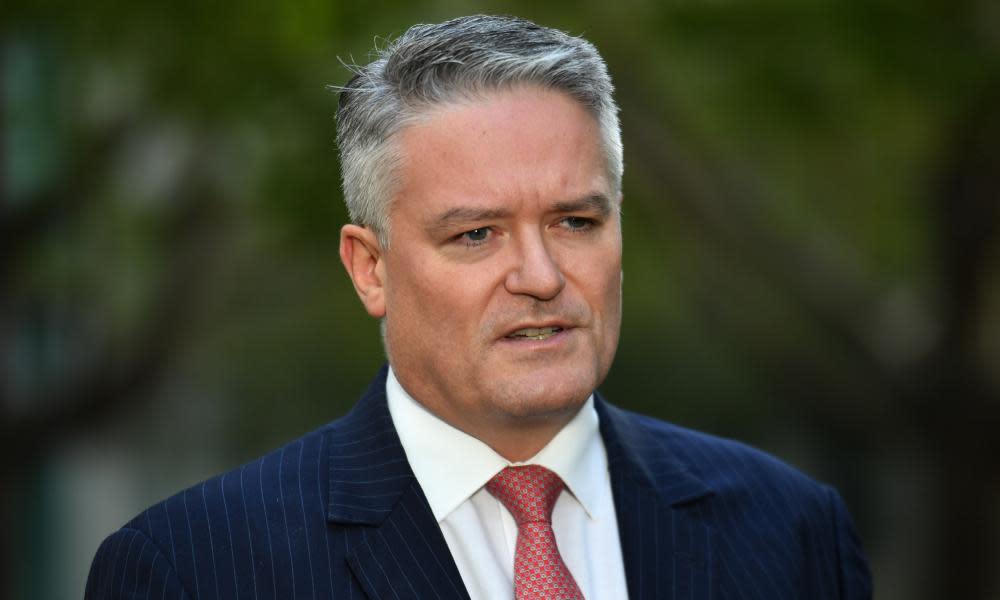Australian Black Lives Matter protests ‘incredibly selfish’, Mathias Cormann says

Australia’s finance minister Mathias Cormann has condemned Saturday’s mass protests to demand an end to Indigenous deaths in custody as reckless, selfish and self-indulgent.
Cormann used an interview on Sky News on Sunday to launch a full-throated attack on participants of Saturday’s events in several cities because the protests proceeded in contradiction of current health advice to avoid mass gatherings.
“It’s quite irresponsible what we’ve seen there,” Cormann said. “As I think about the heartbreak of families who haven’t been able to attend funerals for their loved ones because they were doing the right thing by taking the health advice, my heart just goes out to them.”
Related: Australian Black Lives Matter protests: tens of thousands demand end to Indigenous deaths in custody
“I mean, as they see people going recklessly to these sorts of demonstrations, that must be just awful for them to watch. I think it is incredibly selfish. It’s incredibly self-indulgent. And yes, it does impose unnecessary and unacceptable risk on to the community.”
The deputy leader of the opposition, Richard Marles, acknowledged that protests in the middle of a pandemic were a “vexed issue” but he said Cormann’s rebuke on Sunday was “tone deaf”. Marles said if people were born Indigenous in Australia, life outcomes in education, employment, mortality and incarceration were materially worse than non-Indigenous Australians.
“I don’t feel like I’m in a position to say to Indigenous Australians who are protesting against that, that this is a selfish and indulgent act,” the deputy Labor leader told the ABC. “I felt uncomfortable about the mass gathering, but I’m not about to engage in that kind of judgment of those who did it.”
Ahead of the protests, the prime minister validated the cause as important, but his strong advice, and the advice of the chief medical officer, Brendan Murphy, was that people not attend the mass gatherings.
While acknowledging wrongs were done in this country, Morrison also questioned those drawing comparisons between Australia and the situation in the United States, where protesters have rallied for several days following George Floyd’s death at the hands of police in Minneapolis.
Related: Deaths inside: every Indigenous death in custody since 2008 tracked – interactive
“There’s no need to import things happening in other countries here to Australia,” Morrison said last week. The prime minister insisted problems of Indigenous disadvantage were being dealt with and “we don’t need to draw equivalence here”.
“We don’t need the divisions that we’re seeing in other countries – we need to stick together and look after each other,” the prime minister said.
The health minister Greg Hunt said it was unclear whether the weekend rallies would cause a spike in Covid-19 infections, “but if there is someone who is infectious in the midst of a crowd like that, that can have a catastrophic impact.”
Marles said he would not attend any mass gathering in contravention of the health advice, but he said Morrison’s suggestion that anxiety about institutional racism was being imported “is patently ridiculous”.
“To say to those who are standing up against it and to do something about it, that this is an act of selfishness and indulgence, is wrong.”
There have been at least 434 deaths recorded since the Royal Commission into Aboriginal Deaths in Custody ended in 1991. There have been at least five deaths since Guardian Australia updated its Deaths Inside project in August 2019, two of which have resulted in murder charges being laid.
The economist and Labor parliamentarian Andrew Leigh also published research last year that indicates Indigenous Australians are now more likely to be in prison than African-Americans. The research shows that over the past three decades, the share of Indigenous adults in prison has more than doubled, from 1,124 per 100,000 adults in 1990 to 2,481 per 100,000 adults in 2018.

 Yahoo News
Yahoo News 
